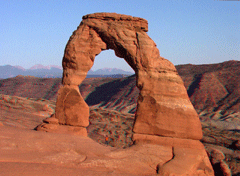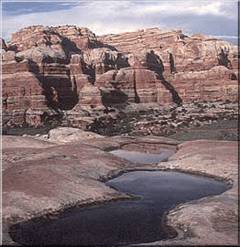Federal Court Halts Drilling Near Parks
Air Date: Week of January 23, 2009

The original Bureau of Land Management decision would have issued leases for oil and gas drilling within sight of Arches National Park in Utah. (Courtesy of the U.S. Geological Survey)
In a last minute weekend ruling, a federal judge issued a restraining order on the sale of oil and gas leases near several national parks. Idaho Statesman reporter Rocky Barker tells host Steve Curwood it’s now up to the Obama administration to make the next move on oil and gas exploration in the region.
Transcript
CURWOOD: From the Jennifer and Ted Stanley Studios in Somerville, Massachusetts - this is Living on Earth. I’m Steve Curwood.
FEINSTEIN: It is my great personal honor to present the 44th President of these United States, Barack Obama.
[CHEERS]
CURWOOD: In calling for the nation to act boldly and swiftly Barack Hussein Obama repudiated the ideology, actions and inactions of his predecessor.
OBAMA: We will restore science to its rightful place, and wield technology's wonders to raise health care's quality and lower its cost. We will harness the sun and the winds and the soil to fuel our cars and run our factories.
CURWOOD: On day one President Obama signed an order that alters disclosure rules, giving the public the right to know in all but the most the sensitive government proceedings and documents. This marks a sharp break with the Bush White House in procedures that will affect public health and environmental protection.
Anticipating the change of the presidential guard, a federal judge blocked a controversial last minute move by the Bush administration allowing drilling for oil and natural gas in Utah and Colorado, close to national parks. Rocky Barker is an environmental reporter for the Idaho Statesman, and joins me now for an update.
Hi, Rocky!
BARKER: Good to talk to you.
CURWOOD: So this judge went to work on a Saturday to issue this temporary restraining order. Why? What’s so urgent? What makes this land so special?

Canyonlands National Park in Utah (Courtesy of U.S. Geological Survey Marli Miller)
CURWOOD: Why do this on a Saturday? Why did he do this over the weekend?
BARKER: I think he wanted to make sure that that decision was clearly stopped until the new administration came. And he made a judgment in that restraining order that I think that a lot of Americans would agree with is he said while there was clearly a national interest to drill for more oil and gas, that interest is not a priority over the interest of protecting our scenic national parks and wild lands.
CURWOOD: Now the judge in this case said that the bureau of land management didn’t do a proper environmental analysis. What was missing?
BARKER: What was missing was they had not done an analysis, according to the judge, of the potential air pollution of the national parks and national monuments in the area, Arches, Canyonlands National Parks and Dinosaur National Monument.
CURWOOD: Now this is not just Utah but this is also Colorado as well now.
BARKER: That’s right. It’s a regional effect. There were about 149,000 acres affected originally. But the BLM when they did this, forgot to talk to the National Park Service, and so they had to go back, consult with them, and they took it down to about 110,000 acres. About three million acres would have been affected from a scenic standpoint.
CURWOOD: Now there’s another unusual element of this case. As I understand it, there’s a 27-year-old University of Utah student named Tim DeChristopher who well – could we say he crashed the party at the lease auction and bought an almost $2 million lease with really no intention or means of paying for it. Can you tell me about that?

The original Bureau of Land Management decision would have issued leases for oil and gas drilling within sight of Arches National Park in Utah. (Courtesy of the U.S. Geological Survey)
BARKER: Yeah, it’s quite interesting. He went there thinking he was just gonna protest, and then at the last minute he thought, well, why don’t I just bid. And he did. He won leases on thirteen parcels and drove the price up on a whole lot of the other ones. By doing this, the BLM went – you know was very angry, and the U.S. Department of Justice actually has begun looking at him for fraud. But eventually he came up with the $45,000 required to hold the leases temporarily, and so he might get off that fraud case. But it is still pending, and he still – you know – he’s still in harms way.
CURWOOD: Rocky, let’s talk about the big picture for a moment. How does this case here involving Arches National Park and Canyonlands and Dinosaur National Monument, how does this fit in with the overall trend you’ve seen under the Bush administration in terms of oil and gas lease sales in the west?
BARKER: For the last eight years, particularly the first four years, they were so aggressive, they put oil and gas wells in places that are particularly important habitat for sage grouse and other desert species. In fact, about the same amount of land was leased during the Bush years as was leased during the Clinton years, except during the Bush years it was a lot of the more sensitive lands that the Clintons and clearly the Obama administration are not going to approve.
CURWOOD: What does it mean now to have a temporary restraining order and how does the arrival of the Obama administration play into what’s going on.
BARKER: Well, a temporary restraining order stops them from doing anything. They can’t move this forward at all. Clearly, if there was a continuing Bush administration, they would push this. They would continue to try to get these sales through. They would have the option of pulling the case back, doing the analysis on air pollution and moving forward. Now though, that the Obama administration is coming in, who has already told us – they’ve been clear in the transition before the new administration took over – that they oppose these. They have the option of just simply dropping the case.
CURWOOD: Rocky Barker is an environment reporter for the Idaho Statesman in Boise. Thank you so much, sir.
BARKER: Thank you.
Links
Living on Earth wants to hear from you!
Living on Earth
62 Calef Highway, Suite 212
Lee, NH 03861
Telephone: 617-287-4121
E-mail: comments@loe.org
Newsletter [Click here]
Donate to Living on Earth!
Living on Earth is an independent media program and relies entirely on contributions from listeners and institutions supporting public service. Please donate now to preserve an independent environmental voice.
NewsletterLiving on Earth offers a weekly delivery of the show's rundown to your mailbox. Sign up for our newsletter today!
 Sailors For The Sea: Be the change you want to sea.
Sailors For The Sea: Be the change you want to sea.
 The Grantham Foundation for the Protection of the Environment: Committed to protecting and improving the health of the global environment.
The Grantham Foundation for the Protection of the Environment: Committed to protecting and improving the health of the global environment.
 Contribute to Living on Earth and receive, as our gift to you, an archival print of one of Mark Seth Lender's extraordinary wildlife photographs. Follow the link to see Mark's current collection of photographs.
Contribute to Living on Earth and receive, as our gift to you, an archival print of one of Mark Seth Lender's extraordinary wildlife photographs. Follow the link to see Mark's current collection of photographs.
 Buy a signed copy of Mark Seth Lender's book Smeagull the Seagull & support Living on Earth
Buy a signed copy of Mark Seth Lender's book Smeagull the Seagull & support Living on Earth

